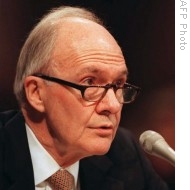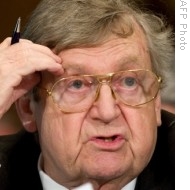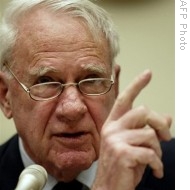voa标准英语2008-Analysts Say Middle East Top Priority for Obama
搜索关注在线英语听力室公众号:tingroom,领取免费英语资料大礼包。
(单词翻译)
One of the major foreign policy challenges facing the Obama administration will be how to revive the Middle East peace process. Senior Correspondent André de Nesnera spoke1 with three former senior U.S. government officials about the situation in the Middle East. The interviews were conducted before the current violence between Israeli forces and the militant2 group Hamas which controls the Gaza strip. |
| Former National Security Advisor3, retired4 General Brent Scowcroft |
Most analysts5 agree the incoming Obama administration faces a daunting6 task in trying to find a peaceful solution to the Middle East crisis. For eight years the Bush administration has been trying to resolve that issue - but with little success.
Former National Security Adviser7 (1974-77;1989-93, retired Air Force) General Brent Scowcroft says Barack Obama must get involved in the Middle East early in his presidency8.
"I certainly hope so. There will be a lot of people saying don't do it," he said. "Presidents in the past have foundered9 on the peace process issue - so it's too dangerous."
For his part, former Secretary of State (1992) Lawrence Eagleburger says the issues that need to be resolved are immense.
 |
| Former US Secretary of State Lawrence Eagleburger (File) |
"I'm not at all certain that any involvement by anybody at any time is going to solve the problems of Israel and the Palestinians and the terrorists," said Eagleburger. "It is an almost insoluble problem. Every time some Palestinian or someone on that side of the fence moves to try to come to grips with the issue and make compromises, either they end up dead or they're ousted10 from office. It's the intransigence11 of a part of the Palestinian side of the fence - some of the people in that group just are intent on never having a solution to the thing, but driving Israel to the sea at some point."
Former National Security Advisor Scowcroft believes that for progress to be made in the Middle East, the United States must talk to Hamas, the largest and most influential12 Palestinian militant movement, which controls the Gaza strip.
"I think we should be open to negotiate with anybody. It's much harder to solve problems if you don't talk to people," added Scowcroft. "And you don't necessarily solve problems by talking to them. But at least you open up the avenues, you understand what the hard sticking points are and how to resolve some. And you see if there is a chance for progress and if so, what kind."
The Bush administration has rejected any talks with Hamas, describing it as a terrorist group.
Eagleburger says the U.S. shouldn't talk to Hamas.
"I find it very difficult to conceive of or to approve talking to such an enemy - and that's what they are. I don't think we are likely to achieve much," he said. "On the other hand, I am prepared to concede to those who argue that we should be talking to these people - we're certainly not getting anywhere the way it is now. On balance, I don't think we should do it because it is giving Hamas a position that I don't think they deserve, and that is that the United states is prepared to talk to them. But I think it's a close call."
 |
| Former Defense13 Secretary James Schlesinger |
Former Defense Secretary James Schlesinger (1973-1975) believes the United States will continue to abide14 by its "no talks with Hamas" policy.
"I don't see any likelihood that we are going to significantly change our position. We might have, as we have in the past - as you may recall that the Palestinian organization [Palestine Liberation Organization led by Yasser Arafat] was talked to privately15 during the Carter administration - but never admitted publicly until the story blew. And if we were to talk to Hamas, it would be on a very devious16 route and not for public consumption," said Schlesinger.
During the presidential election campaign, Barack Obama said he does not support negotiations17 with Hamas until it renounces18 terrorism and recognizes Israel's right to exist. Analysts say it will be interesting to see, given the violence between Hamas and Israel, if he will maintain his position once he is inaugurated president January 20.




